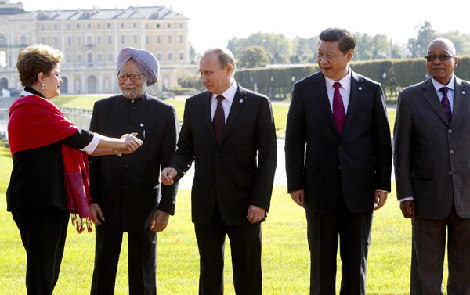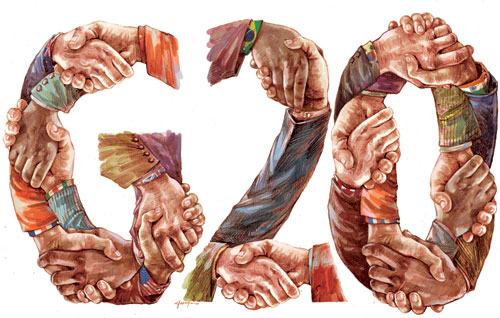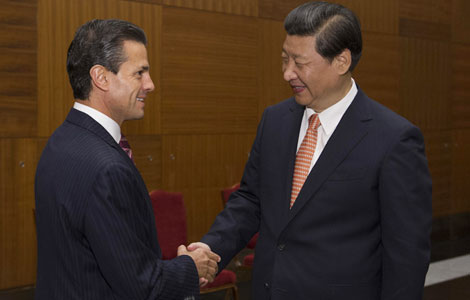Emerging markets must be heard
Updated: 2013-09-06 02:57
(China Daily)
|
||||||||
 |
1 The likely tapering of asset purchases by the US Federal Reserve comes in response to a better outlook for the country's economy. Our near-term forecast suggests that the US will continue to grow at 2.5 percent this quarter and the next. In this context, the increase in long-term interest rates in the US represents good news, as it signals the US economy is beginning to come out of a great recession. It will be positive for BRICS, as rising US imports are likely to benefit the exports of those nations, though to varying extents.
In the second quarter, the growth of GDP in BRICS picked up but remained weak by historical standards. However, the economies of the BRICS nations show considerable differences. India and Russia are experiencing sharp slowdowns in growth, while activity has been well maintained in Brazil and South Africa. In China, a recovery appears to be underway.
The current weakness in exchange rates of the BRICS nations mainly reverses earlier movements. Immediately after the crisis, exchange rates appreciated as the Federal Reserve eased its policy. Once a policy change seemed likely, exchange rates fell. In most cases, the fall has more or less offset the previous rise. The principal exceptions are India and Russia, where exchange rates have sunk below their levels during the peak of the 2008 crisis. Growth has slowed markedly in these countries.
These exchange rate gyrations have, of course, created some problems for these countries. Current account deficits have widened, but the movements have not been equal across the BRICS. The largest adverse changes were once again in India and Russia.
The major risk facing most of the BRICS nations is that depreciation in exchange rates would spark a new round of inflation. Countries with credible monetary policies should be able to avoid major surges in inflation. Three of the BRICS nations generally aim for about 4.5 percent inflation. To help remain within their targets, two of these countries have raised interest rates.
2 Policies across the BRICS vary considerably. Information exchanges about economic policies are key to improving the resilience of BRICS during economic shocks. All of the BRICS nations are regularly invited to discuss economic policy at the Organisation for Economic Co-operation and Development committee meetings. There, they can collaborate with other emerging market countries. Not all of the BRICS nations attend regularly, but global problems require global solutions.
China has already set up a number of arrangements with emerging countries to counter any short-term shortages of foreign currency for bilateral trade. Over the longer term, though, it is difficult to sustain fixed exchange rates without appropriate internal policies.
3 Countries at the G20 summit face considerably different economic situations. It is natural for countries to respond to their internal economic situations. Indeed, many central banks are required by law to do so. The summit has coordinated action in the past, and we see the results of these decisions in the recovery that is now evident in developed countries. Whether or not the recovery becomes evident in BRICS, as it already has in China, will depend mostly on their internal policies.
The exchanges at the G20 and the OECD are central to reaching a consensus on economic policies. Some of these common ideas, such as tax avoidance and bank regulation, have already been put into place by international organizations. A joint solution for controlling international capital flows, and exchange rates, would require a marked change in thinking among the advanced countries, and a number of emerging market countries. For the past 40 years, most of the leading economic powers have preferred to focus on floating exchange rates and open capital markets.

 China, Russia a step closer on gas supply
China, Russia a step closer on gas supply
 18-year-old panda conceives triplets
18-year-old panda conceives triplets
 Testing times for G20 leaders
Testing times for G20 leaders Homemade choppers make aerobatic stunt debut
Homemade choppers make aerobatic stunt debut
 Shanghai's visa-free policy lifts tourism
Shanghai's visa-free policy lifts tourism
 Panda twin cub born at Atlanta Zoo
Panda twin cub born at Atlanta Zoo
 Xi, Mexican president meet for third time
Xi, Mexican president meet for third time
 Samsung unveils smartwatch ahead of rival Apple
Samsung unveils smartwatch ahead of rival Apple
Most Viewed
Editor's Picks

|

|

|

|

|

|
Today's Top News
China, Russia a step closer on gas supply
Japan to test wall for leaking water
Low-budget education abroad for working-class
Shanghai's visa-free policy lifts tourism
Brazil asks for apology from US on spying
Xi calls for closer G20 ties
US service providers eye China
Commuter aviation expected to take flight soon
US Weekly

|

|





